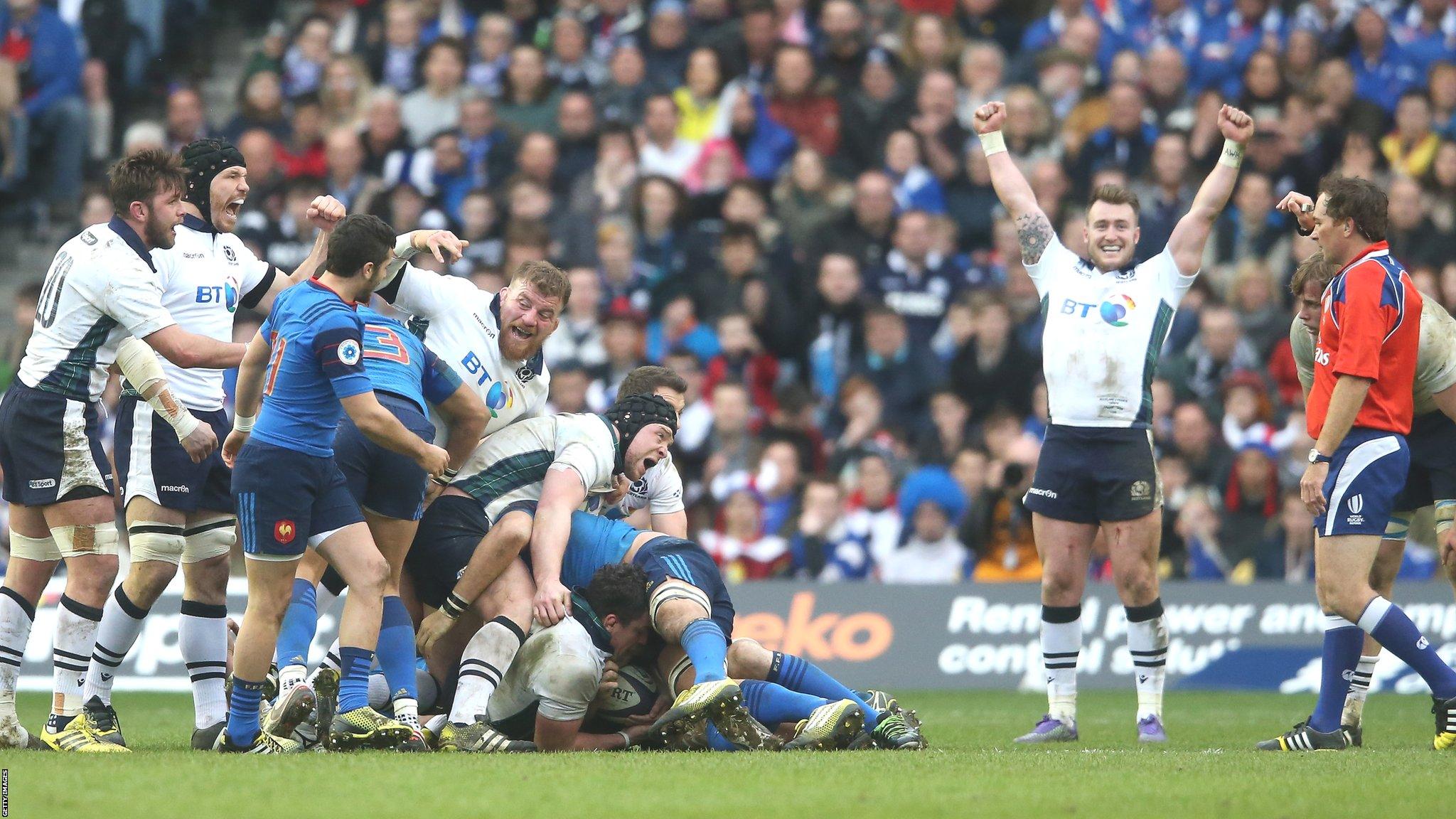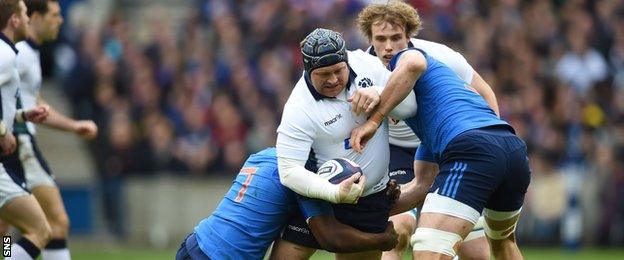Scotland 29-18 France: Vern Cotter's men make good on promise
- Published

Scotland will be targeting a third consecutive Six Nations win when they visit Dublin on Saturday to take on Ireland
From the time the scrum was set to the moment Stuart Hogg's footwork got him over the French line for Scotland's opening try, the ball went through the hands of 13 different Scottish players in 14 phases that lasted one minute and 48 seconds.
These numbers are hardly revelatory. We've seen them from Scotland before against France and England and Ireland and Wales and pretty much everybody else you care to mention.
We've seen Scotland hold on to the ball for an age in games like this. For a decade and more we've seen them batter their way from halfway, across the opposition 22 and up to the try-line.
And then we've seen it all go wrong.
Not just seen it, but expected it. The expectation is changing, though. Murrayfield's fatalistic attitude is under threat now that Scotland have backed up their win in Rome with their first victory over France in 10 years. The 29-18 scoreline is also their biggest win over France in 17 years. This is the kind of history that Scotland want to be involved in.
Six Nations Highlights: Scotland 29-18 France
It's only a few short weeks, but it seems like an eternity since Greig Laidlaw's men were being spooked by the thought of 10 championship losses in a row. Now the narrative has altered and it's become about a shot at three straight wins, in Dublin on Saturday - a feat that Scotland haven't managed in this competition since Rob Wainwright's team of 1996.
Ireland will have more substance than France. Better players, greater motivation, a cannier coach in the celebrated Joe Schmidt, Vern Cotter's old pal from their days at Clermont. On Sunday, France showed again that their reputation outflanks their reality. Guy Noves isn't so much staging a revolution as a re-run of recent failings.
Scotland had the hammer blow of an early French try, then they lost their stand-off, Finn Russell. In the opening 13 minutes, Cotter's side gave up a try, three penalties and a line-out and for those of us who can still see the ghosts of the past, it was ominous.
Brilliant, instinctive Hogg

Stuart Hogg scored Scotland's first try and brilliantly tipped the ball to Tim Visser for their third
This team, though, has a resolve that doesn't just exist in sound-bites in press conferences. It was there in glorious deed.
Stuart Hogg typified it. In a game that is dogged, at times, by brutality and danger, Hogg reminds you of rugby's beauty. He's a modern player but he plays the way the maestros of yesteryear played, back in a time of space and freedom and invention.
Hogg will get the headlines but he had a hell of a supporting cast.
Duncan Taylor has gone from nowhere man to pivotal in the midfield. Laidlaw has gone from a slightly haunted leader into an inspirational one. John Barclay has exposed as lunacy his long exile from the set-up. There are renaissance stories here.
If they carry on and win in Ireland then even the most doubting of souls would have to admit that a corner has been turned at long last.
Fine margins can lead to finer moments
Tommy Seymour was not one of the names on everybody's lips as the Scotland fans floated out of Murrayfield.
We could start the roll call of key influences in a huge Scotland victory and it would take a while to get to him. Two defenders beaten all day, five carries, 25 metres gained. Solid, but not spectacular. Not by his standards. Seymour is a fine predator, but this was a game where the prey were just a little too hard to find.
Why talk about Seymour? Because of one moment that reveals the truth of what players and coaches say about games of this magnitude being decided by fine margins. Sometimes the margins are so fine that you need to watch the game all over again, pausing and rewinding, to find them.

Duncan Taylor races down the right wing to score for Scotland
This is where Seymour comes in.
Sunday's Test is in its 36th minute and France are on the attack. Maxime Mermoz is blasting up the left touchline, Hogg measuring him for the tackle. In the background is Seymour, watching the play like a hawk, anticipating Hogg's hit and the subsequent ruck, at which he would play a major part that would go largely unnoticed in real time.
When Mermoz hits the floor, Seymour swoops. His timing is perfection. His body immovable. Mermoz has no option but to hold on and give away the penalty. What happens next is Scotland's progression in microcosm.
Everything is quick and accurate - the decision-making and the execution. Seymour rips the ball out of Mermoz's grip and shovels it to Taylor, who is 10 metres inside his own half but blissfully aware of the opportunity at hand. He taps and goes - and goes.
Virimi Vakatawa can't stop him. Neither can Wenceslas Lauret. Taylor gallops on and scores in the corner, then Laidlaw bangs over the conversion from the touchline. Seven beautiful points in the blink of an eye.
Seymour didn't score on Sunday, he didn't make any box-office plays or produce moments that got Murrayfield to its feet, but his contribution at that breakdown had a huge ripple effect. It set Taylor in motion, whose try shook France, who never fully recovered.
That was Scotland's second try of the day and a window to the new team's ambition. So, too, the third. We will remember Laidlaw flinging out a speculative pass and Hogg helping the ball along to Tim Visser while simultaneously fooling Scott Spedding, who was expecting Hogg to catch it.
Scotland's front-row stalwarts
That was a lovely moment that spoke to Scotland's ability to finish, but the penalty that gave Laidlaw the freedom to throw that Hail Mary pass without fear came on the back of a surge from WP Nel.
This was in the 66th minute - a prop still driving on while the two starting French props had already been replaced. This is the norm for Nel and Alasdair Dickinson, his partner in the front row.

WP Nel's power in the scrum and in open play helped Vern Cotter's side to a satisfying win over France
Dickinson has played 282 minutes of this Six Nations, Nel has played 298. Of all the other props only England's Dan Cole has had more involvement (301 minutes).
As a partnership, Dickinson and Nel have been out there together far longer than any other starting props. It's a symbol of their great strength but also a sign of the uncertainty about what's in reserve.
The burden on them has been huge, but these are physically and mentally strong men. Against France, they were part of a Scottish pack that won three scrum penalties and two scrum free-kicks (Scotland won a fourth penalty when Moray Low replaced Nel). In Rome, they won six scrum penalties.
Joy at scrum-time is a new phenomenon for Scotland - as is winning Six Nations matches. They have two in a row now. After Sunday, Ireland won't doubt their capacity to make it three.
- Published14 March 2016

- Published13 March 2016

- Published13 March 2016

- Published13 March 2016

- Published14 September 2016
